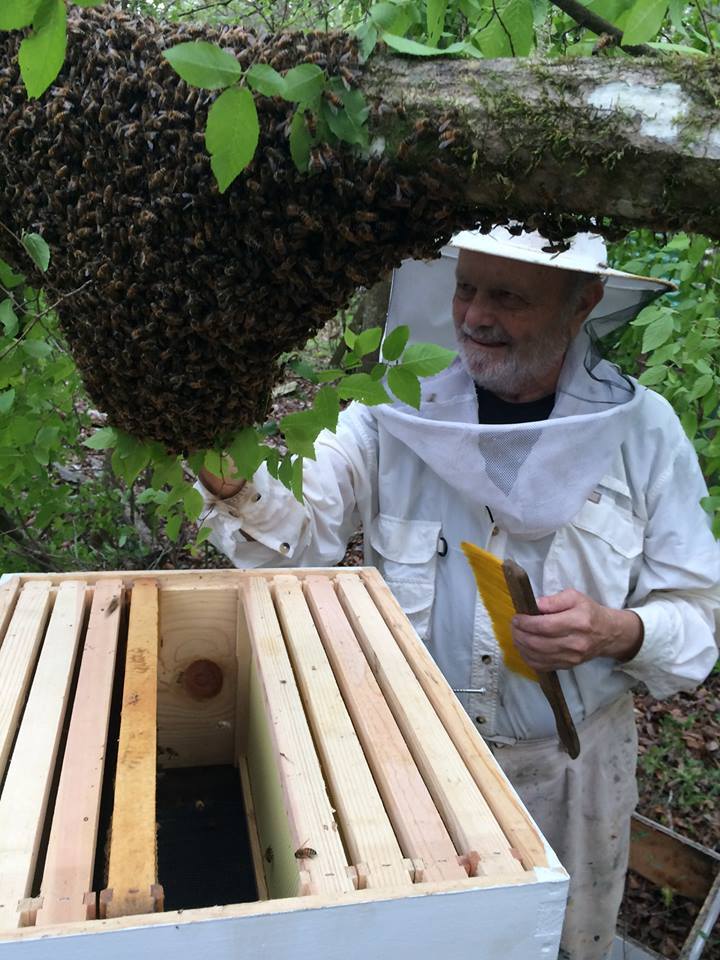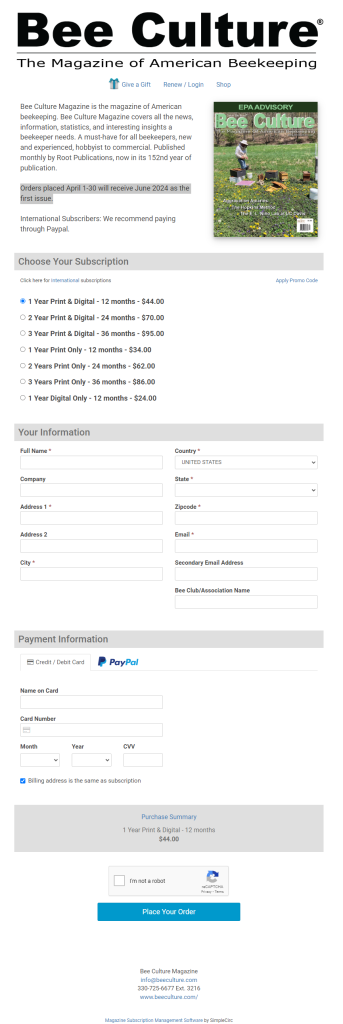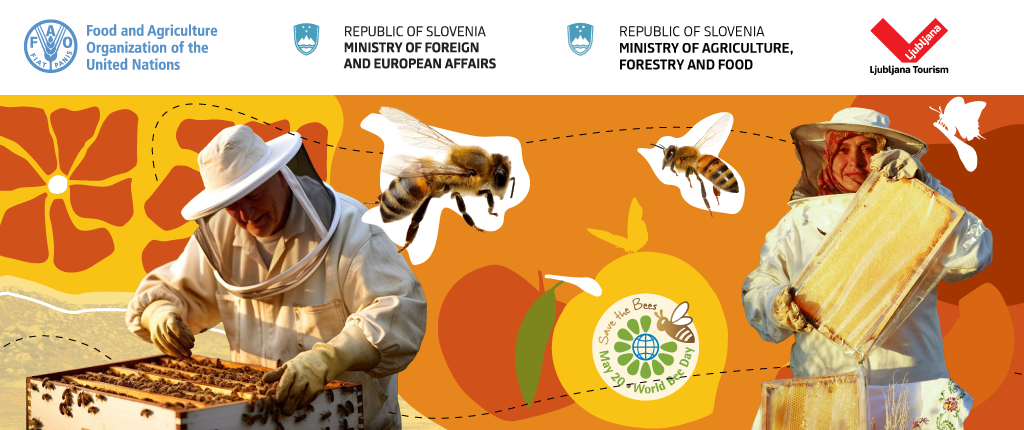Ever wonder what happened to Dr. Malcolm T. Sanford, Extension Apiculturist and Professor Emeritus at the University of Florida? Subscribe to the Apis Information Resource News for direct correspondence from him on a continuing basis. He has refurbished his long-standing Apis newsletter last year to make it correspond with a website in development, the Apis Information Resource Center http://beekeep.info. The last few issues should bring you up to date on Dr. Sanford’s recent cancer diagnosis and ongoing treatment. If the name is not familiar, check out his resume at http://apisenterprises.com/vita.htm. Many subscribing to BUZZ already get his newsletter, but others are certainly welcome to join the club via http://beekeep.info/apis-newsletter/.
Apis Information Resource News
Dear Subscribers, I am much improved from last month. The “donor site” (lower right leg) has healed up completely, and I have been cleared by both physical therapy and the home health care nurse. Tomorrow is the last day for what is called “speech therapy.” Mostly that has to do with swallowing issues. I have a much improved pharyngeal swallow. What a process swallowing turns out to be. We do it all the time, fortunately not having to think about what actually has to occur. The doc still wants me to be cleared via barium swallow in the next few weeks and then the G-tube is ready to come out. I’m kind of attached to my consumption “life line,” but it’s time. A big break is that there is no radiation or chemotherapy called for in my case. If you want the full story, consult the last few issues of this newsletter. Although not going to Cuba due to my recent surgery, I am considering taking in the Bee College in Davie, FL. Both Larry Connor and Justin Schmidt will be there. I was a graduate student with Dr. Schmidt at the University of Georgia. He is noted for developing his pain index for stinging hymenoptera (ants, bees and wasps). As part of that trip, I hope to visit Dr. H. Shimanuki in Lake Placid, FL. Although retired, “Shim” and I go way back. He is well known for his active career as research leader at the USDA Beltsville Bee Lab and is a principle editor of the 41st edition of The ABC & XYZ of Beekeeping (A.I. Root Co. 2007). National Pollinator Week has just concluded. For details, see the Pollinator Partnership. Here’s the latest from Fran Bach at the Western Apicultural Society (WAS); June 24, 2016: Topics include: WSU BEE LAB ADDED TO LINKS LIST INVITATION TO EAS IN JULY RESEARCH CHAIR IN BEE HEALTH NAMED 25 MILLION FLOWERS PLEDGED FOR HONEY BEES THIS NATIONAL POLLINATOR WEEK SCIENTISTS SELECTED TO FURTHER QUEST FOR ANSWERS TO KEY BEE HEALTH QUESTION PAm ANNOUNCEMENTS HONEY BEES PRODUCE MILLIMOLAR CONCENTRATIONS OF NON-NEURONAL ACETYLCHOLINE FOR BREEDING: POSSIBLE ADVERSE EFFECTS OF NEONICOTINOIDS CATCH THE BUZZ NOT BEES BUT A GOOD READ: ENGINEERING IMMUNE CELLS TO RECOGNIZE AND KILL CANCER Perhaps most significant news this month is the following initiatve via Project Apis m or PAM; “Paso Robles, Calif. (June 20, 2016) – Project Apis m. announced today the names of scientists and research projects seeking to answer key questions around bee health to receive funding as part of the Healthy Hives 2020 initiative. Healthy Hives 2020 is an initiative of the Bayer Bee Care Program and administered by Project Apis m. with the goal of improving the health of honey bee colonies in the United States by the year 2020. “Projects funded cover critical bee health topics such as bee nutrition, Varroa and disease management, and enhanced management techniques through smart-hive technology. The recipients were selected from a total of 23 research proposals seeking to provide practical and tangible solutions to the key issues affecting the U.S. beekeeping industry. More projects will be funded as the Healthy Hives initiative moves forward. “PAM has also joined forces with the Honey Bee Health Coalition to in its words: “The Coalition can take us places we couldn’t go alone. Project Apis m. is proud to be a member and to have a role on the steering committee.” PAM has become a major player in honey bee research over the last few years, principally due to the Almond industry’s concern about the health of its pollinators. The web site is full of relevant information, including words from the Chairman, Dr. Gordon Wardell, known for his studies on honey bee nutrition. His latest offering concerns climate change’s effect on goldenrod, an important food source for honey bees. There is a significant risk that pollinators and their plants might get out of sync due to climate change, resulting in unintended consequences. Finally, the current PAm Executive Director is stepping aside: “After 10 years, $6 million in honey bee research and programs, 53 board meetings, and hundreds of presentations and articles, I am passing the baton for PAm 2.0 to Danielle Downey, PAm’s new Executive Director. PAm 1.0 was far more successful than any of us could have imagined. Providing funds for scientists working to help honey bees, awarding scholarships to build the next generation of new scientists, purchasing equipment for bee labs, initiating habitat and BMP programs, gaining a solid reputation not only within the bee industry, but also among scientists, regulators and with corporate sponsors and then leaving PAm financially sound with an awesome new leader make me proud of what we have accomplished during the reign of PAm 1.0. I still have many years of mountains to climb, grandchildren to love, and even some bee projects where I can assist, but running PAm is a big job and requires new vision with more youth and energy! An overwhelming thanks to our great board, staff, science advisors, scientists, sponsors, donors and most of all to an industry where people are not just colleagues, but life-long friends.” Christi Heintz. The latest Kelley Beekeeing Newsletter is 40 pages long! Most interesting is a dialogue between readers and Liz Walsh at Texas A & M University in reponse to her last month’s article titled, “Varroa, miticides, and IPM for beginning, intermediate, and advanced beekeepers.” Also see the article about a Ukrainian program helping soldiers returning from the front reestablish their civilian lives via beekeeping. Similar programs are also found at the Baton Rouge Bee Lab, the Minnesota Bee Lab effort and West Virginia’s assistance to veterans. The 2017-2018 Core Fulbright U.S. Scholar Program competition is now open! Award descriptions can be found in individual listings in the online catalog. Grant activities include teaching, research, teaching/research, and administrator seminar grants – there is no shortage of options for any scholar or qualified professional who may have an interest in the program. In addition, some like myself no longer in active in formal academia can apply for the Specialist Program. As always, check the latest extension efforts at the Bee Health Extension site. Aaron Hoshide is featured from the University of Maine Eighty five units of Storey’s Guide to Keeping Honey Bees were sold on Amazon.com from May 23 through June 19. Seattle – Tacoma, Washington led the way.
follow on Twitter | friend on Facebook | forward to a friend
Copyright © 2016 Apis Information Resource
Center, All rights reserved. Our mailing address is:
Apis Information Resource Center
5002 NW 64th Lane
Gainesville, FL 32653









